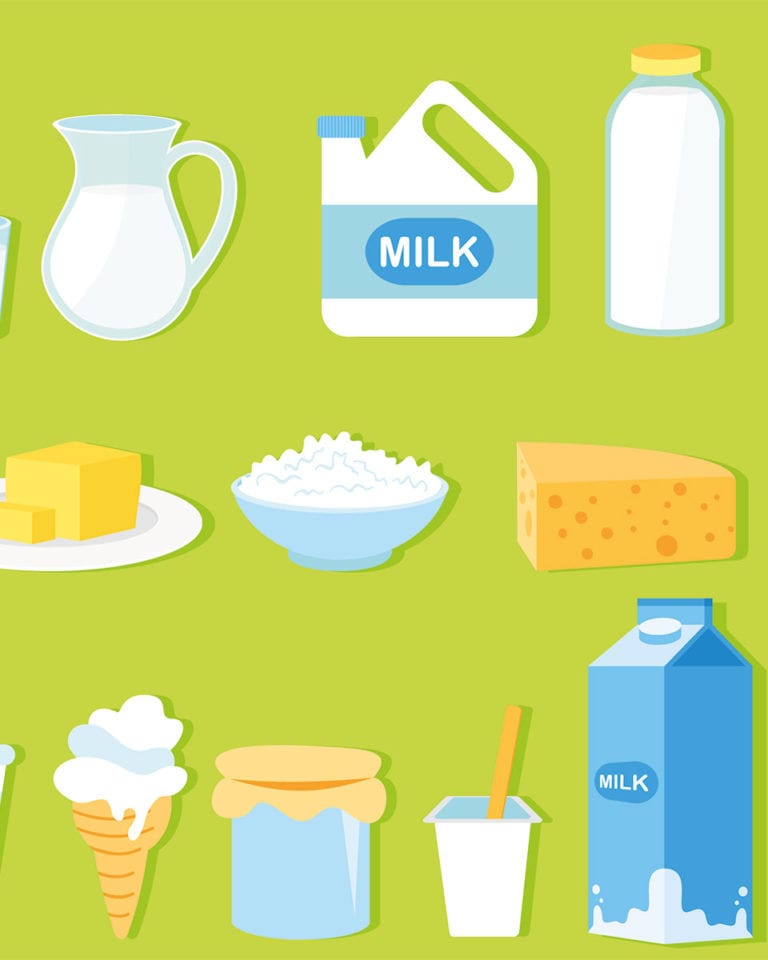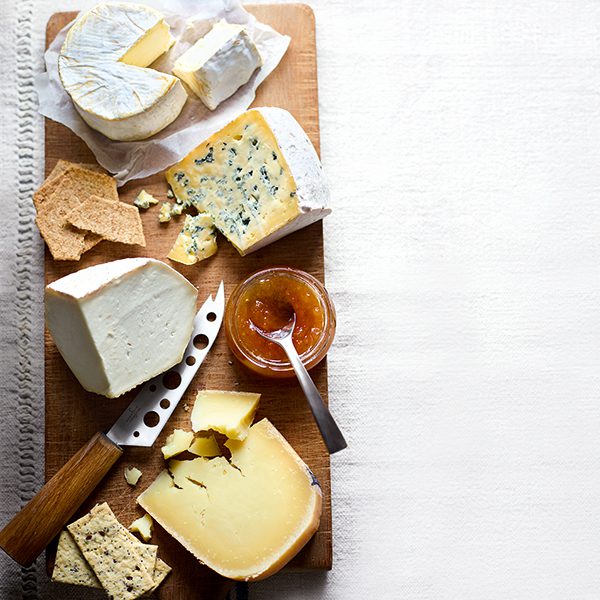Lactose intolerance: are we too quick to cut dairy from our diets?
The lactose-free market is booming, says Sue Quinn, but many people are misdiagnosed as lactose-intolerant. And even if you are lactose-intolerant, do you really need to give up dairy completely?
We look into the facts and the science and give our thoughts on this hot topic.

Stroll down the dairy aisle of your local supermarket and you might notice some products aren’t quite what they used to be. Certain brands of cream, margarine, milk and cheese now carry labels stating they’re lactose-free, which means they don’t contain the naturally occurring sugar – lactose – found in animal milk.
Why are lactose-free foods selling so well?
According to Kantar Worldpanel, sales of these products in the UK surged by 21% in the past year to more than £133 million. Demand has been driven by a rise in people who believe lactose intolerance is to blame for gut problems they suffer from, including bloating, tummy pain, flatulence and diarrhoea.
But some gastroenterologists and registered nutritionists are worried that there’s widespread confusion about lactose intolerance. Some people are diagnosing themselves with the condition based on ‘a hunch’, when their symptoms are actually caused by something else. Others are ditching dairy products completely when this probably isn’t necessary, and run the risk of developing nutrient deficiencies. So, what exactly is lactose intolerance? And if you experience symptoms, is lactose-free dairy – or no dairy at all – your only option?
A missing enzyme?
In order to digest milk and some dairy products properly, our bodies need to break down lactose into its component sugars: glucose and galactose. This is the job of lactase, an enzyme produced in the small intestine of baby mammals.
In most people, production of lactase switches off or declines after weaning. Many people who lack the lactase enzyme still manage to digest lactose easily. But a subset of this group experiences the gut problems commonly associated with lactose intolerance. These symptoms occur because lactose passes undigested into the large intestine, where it feeds gut bacteria, producing hydrogen and other gases. But many people who believe they’re lactose intolerant may not be, says Dr Megan Rossi, registered dietitian, gut health expert and author of Eat Yourself Healthy (Penguin Life £16.99). Many patients go to see her after taking food intolerance tests that incorrectly show they’re sensitive to a long list of foods. (According to the NHS, a number of companies produce food intolerance tests, but these “are not based on scientific evidence” and are not recommended by the British Dietary Association.)
“Many people associate their gut symptoms with eating, but once we delve a little deeper, only a few turn out to have food-specific symptoms, such as a food intolerance,” Dr Rossi says. “Stress, sleep and exercise are key for good gut health too, so if you’re not sleeping right or your stress levels are through the roof, your gut health will likely be affected.”
Approved testing is vital
Dr Saliha Mahmood Ahmed, gastroenterologist, chef and author of Foodology: A Food Lovers’ Guide to Digestive Health & Happiness (Yellow Kite £20), says it’s important to be properly tested for lactose intolerance before giving up dairy. “It’s very frustrating,” she says. “I see a lot of people on restricted diets based on no particular evidence.”
Similar symptoms can be caused by other conditions, such as Irritable Bowel Syndrome, or an intolerance to a different food. “Fructose, for example, can cause symptoms that are virtually indistinguishable from lactose intolerance,” Dr Mahmood Ahmed says. “If you’re avoiding lactose because you have a hunch you are lactose intolerant, my advice is to go to your GP.” A hydrogen breath test will confirm whether you have the lactase enzyme. If you do, it’s probably not lactose intolerance causing the symptoms and your doctor can investigate further. If you are lactose intolerant, a dietitian can help you adjust your diet. But this doesn’t necessarily mean giving up dairy entirely.
Does lactose intolerance mean you can’t eat any dairy?
Not necessarily. Most people who are sensitive to lactose can still consume some dairy. Research suggests up to 12g lactose (about 250ml cow’s milk) in one sitting is often tolerated – and more if it’s ingested in small amounts throughout the day and/or with meals. The British Nutrition Foundation (BNF) suggests you experiment carefully with different quantities of dairy to find out how much you can consume without triggering symptoms. People sensitive to lactose can often consume live yogurt and kefir, as these contain bacteria that help digest lactose. (However, some yogurt is thickened with milk powder, which contains lots of lactose and negates this benefit). Butter contains a small amount of lactose, but ghee – clarified butter used in Middle Eastern, Southeast Asian and Indian cuisines – has even less, as the milk solids have been removed.
"Aged hard cheeses such as gouda, emmental, cheddar and parmesan contain little or no lactose (the longer they’ve been aged, the less they contain)."
Professor Alan Kelly, a dairy scientist at University College Cork’s School of Food and Nutritional Sciences, says some cheeses contain little or no lactose. “It’s partly due to the whey [the liquid that contains the lactose] being drained away during the cheesemaking process and residual lactose being consumed by the bacteria present in the cheese,” Prof Kelly says.
Generally speaking, aged hard cheeses such as gouda, emmental, cheddar and parmesan contain little or no lactose (the longer they’ve been aged, the less they contain). “Any cheese ripened for more than a couple of months can be assumed to have so little lactose left as to be lactose-free,” says Prof Kelly.

Soft cheeses such as camembert and brie don’t contain much lactose either, because the microbes in the cheese are good at breaking it down. Fresh cheeses such as cottage cheese and fromage frais have higher levels of lactose. But remember, high-lactose cheese can be tolerable in small portions.
What are lactose free dairy products?
Dairy products promoted as ‘lactose free’ have had lactase added to break down the lactose, and are generally just as nutritious as the standard version.
Consume some dairy if you can
Because milk and milk products are important sources of many essential nutrients, those who can tolerate some dairy should continue to enjoy it, says Dr Mahmood Ahmed. (She stresses this doesn’t apply to people who are allergic to dairy, which is a completely different condition and potentially life threating for some.)
“Speaking with my chef’s hat on, unnecessary lactose or dairy avoidance is sacrilege on culinary grounds alone, because a lifetime without cheese and milk is difficult,” she says. “And nutritionally, there are quite a lot of consequences, particularly of milk avoidance.” For example, she says consuming insufficient calcium in your diet can lead to osteoporosis or weak bones.
If you are lactose intolerant, it’s a question of adapting your diet to accommodate your sensitivity to it, not giving up a whole food group. “I think it’s really important not to discard your relationship with dairy, but to find one that’s acceptable,” she says.
Subscribe to our magazine
Food stories, skills and tested recipes, straight to your door... Enjoy 5 issues for just £5 with our special introductory offer.
Subscribe
Unleash your inner chef
Looking for inspiration? Receive the latest recipes with our newsletter